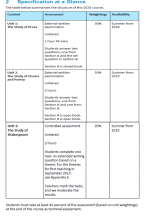English










Our new year in the English department has begun with a bang! We celebrated phenomenal results with our KS4 cohort studying their English Language GCSE. Our 2021/2022 pupils achieved an immense 87.6% A* - C pass rate. The English Literature pupils across Year 12 and 11 achieved a fantastic 100% A* - C pass rate. We are so proud of them and all their hard work. Not only do we have a new additions to the department - Miss F Rafferty, Miss A Cushnahan, and Miss C Copley - but we are also proud as punch to announce our first ever school production - Annie! Jr.
Throughout our school year, members of the department worked tirelessly to ensure that pupils experienced a wide range of activities to enrich their learning. From drama to story writing, filming to poetry, media and novel analysis to grappling with Shakespeare, our pupils have moved mountains and shown immense dedication to their studies. Alongside curricular requirements, our extra curricular activities have grown exponentially!
We’ve established a Creative Writing after school club, developed links with the local primary school for Short Story projects, collaborated with a the BBC for numerous competitions, and have had great success with our Irish News Critical Literacy project. The Book Buzz scheme has been a big hit amongst our pupils with close to one hundred pupils availing of this and developing their crucial literacy skills, and igniting a passion for literature. Furthermore, our Primary 7 High Achievers from St John the Baptist's Primary and from Presentation Primary will begin their journey with the department on 4th October 2022.
Not only have we collaborated locally, we have connected classrooms across the globe. Through ‘Connecting Classrooms’ we made links with a school in Kenya to allow our pupils to experience a taste and appreciation of other cultures. Our eTwinning project brought our Year 10s to a classroom in Madrid with pen pals established and letters winging their way between Ireland and Spain.
Staff
Ms Susan Murphy (Leader of Learning)
Mrs Stacey Rodgers
Mr Joe Page
Miss Courtney Morgan
Miss Fiona Rafferty
Miss Áine Cushnahan
Miss Carys Copley
KS3 Overview
Key Stage 3
Our Key Stage Three English course is designed to suit pupils of all abilities. Pupils will have 4 periods of English per week along with an additional library period during which pupils read a book of their choice chosen from the Accelerated Reader Programme. The KS3 English course is designed to nurture a love of English and reading in our pupils and to help prepare them for GCSE.
Pupils study the following topics during Years 8-10:
|
Year 8 |
Non-Fiction -Autobiography/About Me Project Fiction – Fantasy Genre – ‘Skulduggery Pleasant’ by Derek Landy or ‘Harry Potter and the Philosopher’s Stone’ by J.K Rowling Poetry – Introduction to Poetry and Seamus Heaney Drama – Introduction to Shakespeare and ‘Macbeth’ Media – Introduction to Media |
|
Year 9 |
Non-Fiction - Leaflets Fiction – Gothic Genre – ‘The Graveyard Book’ by Neil Gaiman or ‘Coraline’ by Neil Gaiman Poetry – Narrative Poetry Drama – ‘Romeo and Juliet’ by William Shakespeare Media - Newspapers |
|
Year 10 |
Non–Fiction – Multi-Modal Texts Fiction – Historical Fiction – ‘Private Peaceful’ by Michael Morpurgo or ‘Animal Farm’ by George Orwell Poetry – War Poetry Drama – ‘A Midsummer Night’s Dream by William Shakespeare Media - Advertising Campaign |
KS4 Overview

English Language
The GCSE in English Language is a core subject and it helps to:
- develop independent study skills that enable students to prepare for further study or employment;
- develop creative, individual responses to problems; and
- select and adapt speech and writing to different situations and audiences.
EXAMINATIONS:
In Unit 1 Section A, students will be asked to complete a piece of persuasive writing.
In Unit 1 Section B, students will demonstrate their reading skills of a media and non-fiction text. Unit 1 will be assessed in Year 11.
In Unit 4 Section A, students will be asked to complete a piece of personal writing or a piece of creative writing.
In Unit 4 Section B, students will demonstrate their reading skills of non-fiction and literary texts. Unit 4 will be assessed in Year 12.
CONTROLLED ASSESSMENTS:
In Unit 2, students are assessed in a range of Speaking and Listening activities, involving: individual presentation and interaction, group discussion and role play. This is internally assessed.
Unit 3 is made up of two tasks:
Task 1: The Study of Spoken Language.
This task is worth 10% and allows students to investigate the characteristics of spoken language, influences on spoken language, impact of spoken language and the importance of context in spoken language.
Task 2: The Study of Written Language.
This task is worth 10% and allows students to analyse the presentation of themes, characters or writing techniques in a chosen text or texts. These are internally assessed.
English Language
The GCSE in English Language is a core subject and it helps to:
- develop independent study skills that enable students to prepare for further study or employment;
- develop creative, individual responses to problems; and
- select and adapt speech and writing to different situations and audiences.
EXAMINATIONS:
In Unit 1 Section A, students will be asked to complete a piece of persuasive writing.
In Unit 1 Section B, students will demonstrate their reading skills of a media and non-fiction text. Unit 1 will be assessed in Year 11.
In Unit 4 Section A, students will be asked to complete a piece of personal writing or a piece of creative writing.
In Unit 4 Section B, students will demonstrate their reading skills of non-fiction and literary texts. Unit 4 will be assessed in Year 12.
CONTROLLED ASSESSMENTS:
In Unit 2, students are assessed in a range of Speaking and Listening activities, involving: individual presentation and interaction, group discussion and role play. This is internally assessed.
Unit 3 is made up of two tasks:
Task 1: The Study of Spoken Language.
This task is worth 10% and allows students to investigate the characteristics of spoken language, influences on spoken language, impact of spoken language and the importance of context in spoken language.
Task 2: The Study of Written Language.
This task is worth 10% and allows students to analyse the presentation of themes, characters or writing techniques in a chosen text or texts. These are internally assessed.
High Achievers Provision
The English Department of SJBC strives to ensure that all pupils are challenged and reach their potential. To this end, we run the High Achievers Programme every Thursday morning from 8am. Pupils are specially selected for the programme using their GL Assessment scores and complete GCSE level work. Pupils also have the opportunity to study for, and sit, a GCSE in Media Studies. The High Achievers Programme builds pupil confidence and prepares them to fulfil their full potential at GCSE.
News
English Literature at KS4

An enjoyment and appreciation of Literature will give students the ability to develop an interest in books and reading as they move away from their studies and into their adult lives. They will have the confidence to approach and tackle new forms of books and writing, as they are exposed to a range of literature during their school days.
When studying Literature, students can learn not only language aspects such as vocabulary items but also that language can be used for specific and aesthetic purposes. Familiarity with the concepts of beat, metre and rhythm can improve their own writing as students are able to appreciate and apply these ideas. Finally, the study of Literature can provide students with a fresh and creative angle with which to approach their studies in particular and their lives in general.
Our GCSE in English Literature encourages students to be enthusiastic, independent, imaginative, critical and analytical readers. It aims to increase their enjoyment of reading, helping to nurture a lifelong love of literature. The specification deepens students’ knowledge and understanding of a range of poetry, prose and drama, including texts by local and modern writers. Students explore the impact of language, structure and form in the texts. Connecting the texts’ ideas, themes and issues is another key focus. Students also learn how to explain settings, characters and themes creatively through social, cultural and historical contexts. They develop their ability to research, plan and prepare their responses using their own ideas and interests, as well as critical reading.
This qualification offers lots of opportunities to develop transferable skills, such as generating creative, individual responses to problems and writing accurately and clearly.
There are two written exams and one extended writing task. One examination will take place
The specification has three units:
- Unit 1: The Study of Prose – J Steinbeck’s ‘Of Mice and Men’.
- Unit 2: The Study of Drama and Poetry – W Russell’s ‘Blood Brothers’ and War / Nature poetry.
- Unit 3: The Study of Shakespeare – Shakespeare’s ‘Macbeth’ or ‘Romeo and Juliet’.
 Menu
Menu




